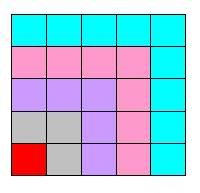What on earth is a ‘gnomon’?
A bit of magic, really.
The Oxford English Dictionary gives several definitions of the gnomon. Here are the two relevant ones:
Lets look at the odd numbers first:
1, 3, 5, 7, 9, 11, 13...
If we sum the first 1 gnomon, we get 1.
If we sum the first 2 gnomons, we get 1 + 3 = 4.
If we sum the first 3 gnomons, we get 1 + 3 + 5 = 9.
If we sum the first 4 gnomons, we get 1 + 3 + 5 + 7= 16.
To make life easier, we’ll arrange the sum of gnomons in a series, like so:
1, 4, 9, 16, 25, 36, 49...
Look! The sum of the first n gnomons correspond to the square of n. The sum of the first 3 gnomons is 9, which is 3 x 3. And the sum of the first 4 gnomons is 16, which is 4 x 4.
Magical isn’t it?
Magic, explained geometrically

A geometric representation of the sum of gnomons.
Start with the sum of the first 2 gnomons, 1 + 3 = 4. From the figure, 1 + 3 is represented as the red square and 3 grey squares. Collective, they form a larger 2-by-2 square.
The sum of the first 3 gnomons is 1 + 3 + 5 = 9. It is represented by the red square, 3 grey squares and 5 purple squares. Collectively, they form a larger 3-by-3 square.
This introduction to number theory brought to you by Tan Yee Wei.
The Oxford English Dictionary gives several definitions of the gnomon. Here are the two relevant ones:
An odd number Something shaped like a carpenter's square; an L-shaped bar, etc.
Lets look at the odd numbers first:
1, 3, 5, 7, 9, 11, 13...
If we sum the first 1 gnomon, we get 1.
If we sum the first 2 gnomons, we get 1 + 3 = 4.
If we sum the first 3 gnomons, we get 1 + 3 + 5 = 9.
If we sum the first 4 gnomons, we get 1 + 3 + 5 + 7= 16.
To make life easier, we’ll arrange the sum of gnomons in a series, like so:
1, 4, 9, 16, 25, 36, 49...
Look! The sum of the first n gnomons correspond to the square of n. The sum of the first 3 gnomons is 9, which is 3 x 3. And the sum of the first 4 gnomons is 16, which is 4 x 4.
Magical isn’t it?
Magic, explained geometrically

A geometric representation of the sum of gnomons.
Start with the sum of the first 2 gnomons, 1 + 3 = 4. From the figure, 1 + 3 is represented as the red square and 3 grey squares. Collective, they form a larger 2-by-2 square.
The sum of the first 3 gnomons is 1 + 3 + 5 = 9. It is represented by the red square, 3 grey squares and 5 purple squares. Collectively, they form a larger 3-by-3 square.
This introduction to number theory brought to you by Tan Yee Wei.

<< Home